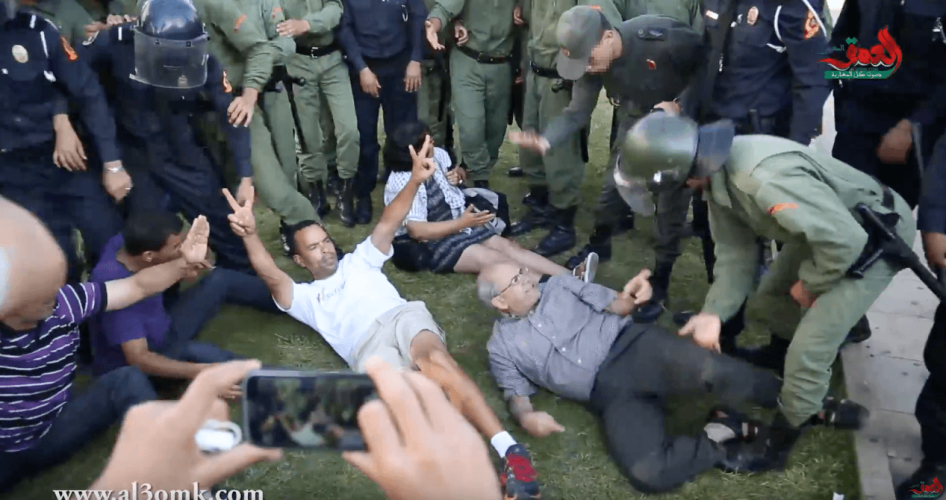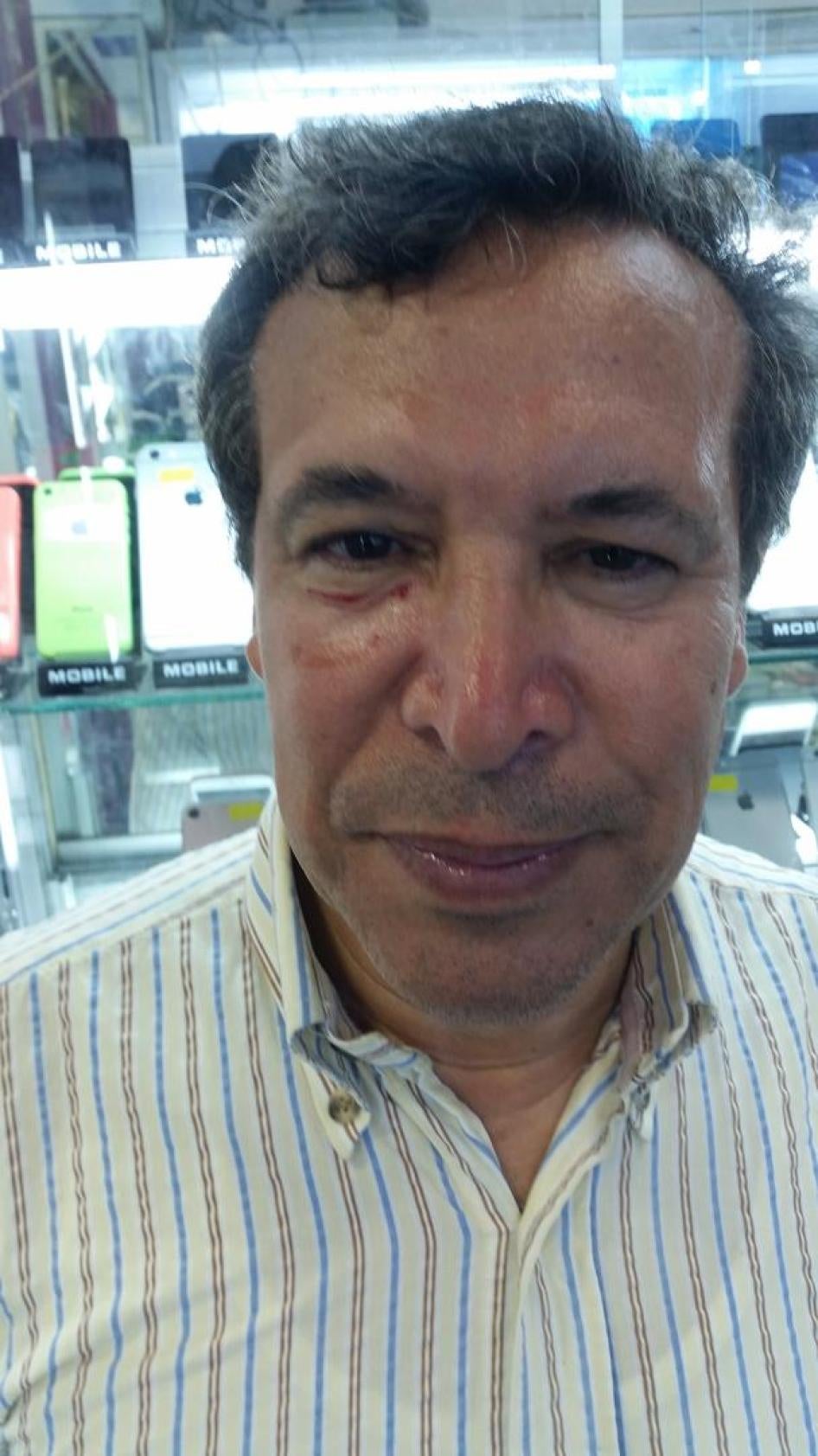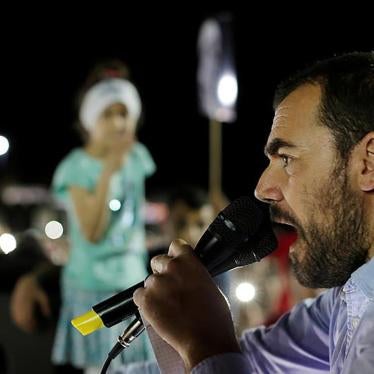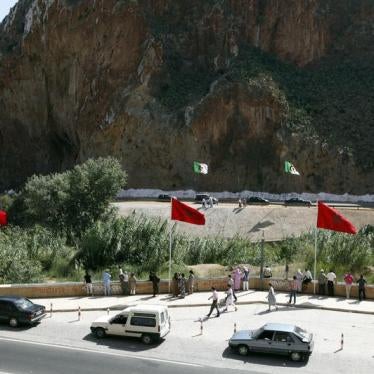(Tunis) – Moroccan security forces used force to disperse a peaceful protest on July 8, 2017, in Rabat, Human Rights Watch said today. The police lightly injured several people, including a human rights lawyer and a news photographer, based on accounts of victims and witnesses, and video of the incident.
The protesters were sitting-in near parliament to protest the detention of Salima “Silya” Ziani, a 23-year-old singer known for her activism in Hirak Rif, the movement for social and economic reform in the northern Rif region.
“Notwithstanding a constitution that guarantees citizens the right to assemble, Moroccan police forces shoved, punched, and kicked a small band of peaceful protesters,” said Sarah Leah Whitson, Middle East and North Africa director at Human Rights Watch. “In Morocco, your right to assemble too often depends on whether authorities appreciate your message.”
Around 7 p.m., police carrying batons started dispersing several dozen protesters who had gathered in a promenade across the street from the parliament building. A video posted by the website al3omq.com showed police chasing, pushing, kicking, and punching male and female protesters. The forced dispersal appears to violate freedom of peaceful assembly, and the use of force may have been excessive, especially given the lack of any evidence of violence by the protesters other than some pushing, Human Rights Watch said.
Khadidja Ryadi, one of the organizers of the sit-in, said, “The police are supposed to warn people at sit-ins three times to depart or be evacuated by force. But this time, they just started pushing people around, and using vulgar insults against them.” Ryadi is a member of the executive committee of the independent Moroccan Association for Human Rights (AMDH), which organizes many such sit-ins in front of parliament. Morocco’s 2011 constitution affirms the rights to free expression and free assembly. Its law on public gatherings requires organizers of demonstrations in public places to notify in advance – but not to obtain prior authorization from – the local authorities, who may then forbid the event if they determine it could endanger “public security.”
The AMDH maintains the sit-ins require no notification since they do not count as “demonstrations” under the public gatherings law. They did not notify authorities in advance of the July 8 sit-in. In a celebrated case in 2001, an appeals court acquitted 36 Moroccans for participating in an “unauthorized demonstration” co-organized by the AMDH at that location, after a lower court had sentenced them to three months in prison.
Abdelaziz Nouaydi, a lawyer who joined the protest, told Human Rights Watch that he heard the police chief ordering his officers to disperse the demonstrators. Nouaydi started to tell the chief that under the public gatherings law, he had to warn the protesters first. But before Nouaydi could finish, the chief lunged forward and punched Nouaydi in the face, he said, breaking his eyeglass frames and cutting his face. Nouaydi is a member of the Human Rights Watch Middle East and North Africa Advisory Committee.
A police officer kicked Maâti Monjib, a historian and activist, in the back as he sat on the ground with his arms raised to signal his peaceful intentions, Monjib told Human Rights Watch. Police also surrounded and kicked Ahmed Rachid, a photographer for the website lakome2.com, and grabbed his camera after they saw him taking a picture of a policeman hitting a female protester in the stomach. The site’s editor-in-chief, Ali Anouzla, said that when he went to Rabat’s main hospital to help Rachid, he counted 12 people there who had been injured when the police dispersed the protesters.
Maina Kiai, the United Nations special rapporteur on the rights to freedom of peaceful assembly and of association, said in an April 23, 2013 report to the UN Human Rights Council:
[…] in a free and democratic society, no authorization should be required to assemble peacefully …. [T]he exercise of the right to freedom of peaceful assembly, should be ‘governed at most by a regime of prior notification whose rationale is to allow State authorities to facilitate this exercise and to take measures to protect public safety and order and the rights and freedoms of others. … [S]hould the organizers fail to notify the authorities, the assembly should not be dissolved automatically…
The Hirak Rif is a protest movement concentrated in Morocco’s northern Rif region that sprang from a fatal incident involving a local fishmonger who was killed in October 2016, while trying to rescue his goods that authorities had just confiscated. The movement has staged mass protests to end what they consider to be the government’s discrimination against the region in terms of economic development.
Authorities have arrested at least 185 people in relation to the protests, convicting 46 to this day of various charges, including armed rebellion and using violence against security forces, and sentencing them to up to 18 months in prison, according to one of their lawyers. He added that many detainees reported to defense lawyers that the police beat them and forced them to sign statements without reading them. “Silya,” whose arrest prompted the July 8 protest, is one of several Hirak leaders arrested since late May 2017.










